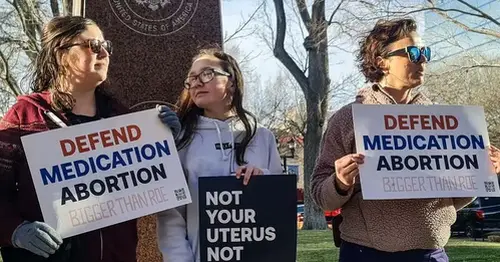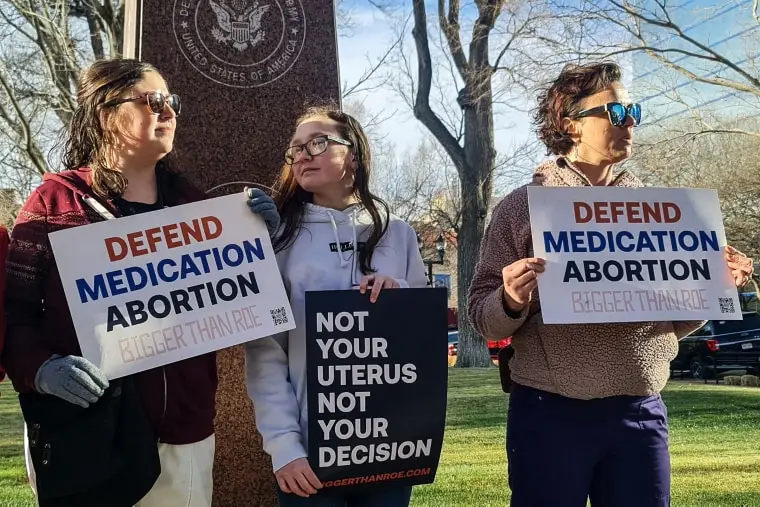
Judge appears sympathetic to abortion pill challenge in Texas hearing
AMARILLO, Texas — A judge appointed by former President Donald Trump heard arguments Wednesday in a lawsuit that aims to ban an abortion medication that women in the U.S. have used widely for over two decades.
During the four-hour hearing, U.S. District Judge Matthew Kacsmaryk appeared sympathetic to arguments from the lawyers for a coalition of anti-abortion groups called the Alliance for Hippocratic Medicine. Their goal in filing the suit was to overturn the Food and Drug Administration’s approval of the pills used to terminate pregnancies, which account for more than half of abortions in the U.S.
At issue was a request from the plaintiffs for a preliminary injunction to pull mifepristone — one of the pills in the standard two-drug regimen — off the market nationwide while the case proceeds.
The drugs used in medication abortions have become increasingly significant in the fights over abortion rights since Roe v. Wade was overturned. Should Kacsmaryk order a ban on mifepristone, it would further hinder abortion access across the U.S.
But in Wednesday's hearing, attorneys for both sides focused largely on the FDA's regulatory and approval process and didn’t mention abortion access or when life begins.
Kacsmaryk seemed to offer the plaintiffs more windows than the defense to clarify and elaborate on their arguments, especially those related to the FDA's approval process and the scope of a potential injunction.

But the judge stumped the Alliance for Hippocratic Medicine's lawyers when he asked whether they could offer another example of a drug with a long-established approval that was yanked from the shelves.
"No, I can't," replied Erik Baptist, senior counsel with the conservative Christian legal group Alliance Defending Freedom.
As to why the legal challenge came so long after the drug's approval, Baptist blamed the FDA, saying it took the agency 14 years to respond to a citizens' petition raising concerns about mifepristone.
"The court has an interest in preventing dangerous drugs from entering the marketplace," Baptist said. “Any relief you grant must be complete. The harm of chemical drugs knows no bound.”
In response, Justice Department lawyer Julie Straus Harris said removing a drug that has been used safely for 20 years would be "unprecedented."
“It is important to step back and think about what the agency did here," Harris said. "The FDA did not require anyone to take it — they simply said it is safe and effective.”
Jessica Ellsworth, who represents drugmaker Danco Laboratories, added that withdrawing approval for mifepristone would undermine both the public's and the pharmaceutical industry's trust in the FDA.
"This injunction is not about upholding the status quo," she said. "They want very much to upend the status quo."
Kacsmaryk complimented both sides for presenting strong cases and said he would "make a decision as soon as possible."
Abortion clinics prepare to lose access to mifepristone
Wendy Davis, a senior adviser at Planned Parenthood Texas Votes, said that based on the judge's background, the group isn’t optimistic.
“I think we can expect the worst, and I think we need to be prepared for that,” Davis said.
Before Trump picked Kacsmaryk to be a judge, he represented a conservative Christian group called First Liberty Institute, which challenged the part of the Affordable Care Act that required employers to cover birth control for their workers.
After a federal judge issued an injunction against that part of the law, Kacsmaryk said it was an “important victory” as the group sought to “defend unborn human life.”
Outside the courthouse Wednesday was a smattering of abortion rights demonstrators and anti-abortion advocates who lined up before sunrise to secure seats in the courtroom.
Among them was Nic Belcher, of Amarillo, and his 14-year-old daughter, Julianne. Both said they hoped the judge would rule in favor of banning the drug.
“I’m excited for this and the opportunities that exist to create a culture of life in America,” Belcher said.
The hearing was the latest development in a lawsuit filed against the FDA in November.
In previous court filings and its statements Wednesday, the Biden administration argued that the Alliance for Hippocratic Medicine doesn’t have the legal standing to bring the lawsuit. It said that the FDA’s approval of mifepristone was supported by extensive scientific evidence and that taking the drug off the market would cause worse health outcomes for people seeking abortions.
The plaintiffs have argued that mifepristone is dangerous, that the FDA didn’t adequately evaluate its safety and that the agency shouldn’t have made abortion pills accessible via telehealth during the pandemic.
The FDA approved mifepristone in 2000. Abortion providers administer the drug — which blocks the hormone progesterone — in combination with misoprostol, which induces contractions.
Research has shown that the regimen has a 0.4% risk of major complications.
Abortion providers said that if access to mifepristone gets cut off, many clinics would administer misoprostol on its own off-label.
“People in the United States deserve to have the most accurate, effective medications as proven by medical evidence, and mifepristone is definitely that," said Melissa Grant, the chief operating officer of Carafem, an online abortion provider that sends abortion pills through the mail in 17 states. "Together, mifepristone and misoprostol complement each other extraordinarily well and are the best and most effective way to end an early pregnancy with medication.”
Misoprostol is safe to take on its own, according to a 2019 study, although it could cause more uncomfortable side effects, such as intense nausea, diarrhea, chills, vomiting or cramping. The medication is slightly less effective than the two-drug combo — its success rates generally range from 80% to 95%, compared to up to 99.6% for the pair.
Merle Hoffman, the founder and CEO of Choices Women’s Medical Center in New York City, said before the hearing that the case suggests even state-level protections aren’t enough to guarantee abortion access.
“Everybody was saying, ‘Well, New York is safe.’ And as far as I’m concerned, there’s no safe place anymore for women and girls in this country,” she said. “Maybe this will wake people up.”






